|
1969
When
The Italian Job was released in the UK,
it didn't receive many blistering reviews,
in fact it was quite the opposite. The
British film review press elite thought
it to be unpolished and rather rude. Despite
the bad press, many individual cinemas
put in a lot of work to promote the film
- displaying Mini Coopers on stairways
and even on the roof of foyers. Even though
it wasn't a smash hit, it was nominated
for a Golden Globe for 'Best English Language
Foreign Film' in 1969.
One
reason that has been cited for it's lack
of popularity was the publicity campaign,
especially in the US. The US (and some
European) posters feature a hard looking
Michael Caine in a thirties style mobsters
outfit with a machine gun in one hand
and a cup of tea in the other, flanked
by a half naked girl with a plan of Turin
on her back! This didn't convey the theme
of the film, there wasn't a Mini Cooper
in sight nor a mention of Michael Caine
except in the small print at the bottom.
All this coupled with the very Britishness
of the film simply didn't register with
the US movie goers, who had no idea of
English football or even the Mini itself.
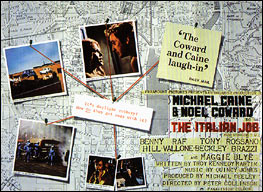
1969 UK Quad
Poster |
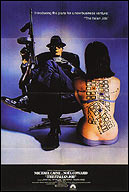
1969 US Poster |
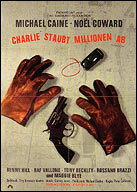
1969 German
Poster |
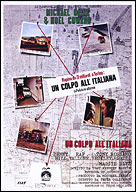
1969 Italian
Poster |
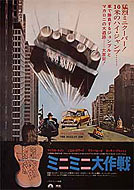
1969 Japanese
Poster |
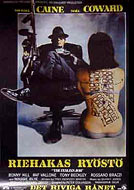
1969 Finnish
Poster |
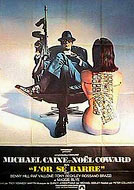
1969 French
Poster |
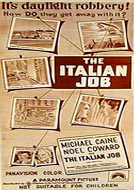
1969 Aussie
Poster |
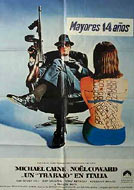
1969 Spanish
Poster |
1999
Back
in 1969, little did the critics know that
The Italian Job would become a full blown
cult movie with later reviews of it's
re-release on the 10th September 1999
being nothing short of fan-bloody-tastic.
In an interview with The Sunday Times,
writer Troy Kennedy Martin had a stab
at explaining why the film had become
such a success 30 years on - 'Much of
the reason why it's so fashionable right
now is today's "Loaded culture",
which has made it alright to be a lad
again'.
In fact it's a lot more than that. Many
critics and columnists have noted various
reasons as to why The Italian Job has
such a place in the hearts of the British
public. It seems to be an amalgamation
of reasons, but it's mainly down to the
inspired ingredients that were first penned
during the films conception, being Caine,
the Mini, Football and kicking our continental
friends asses, oh and not forgetting the
Cockney humour. The film is simply cool,
and gets away with the most coveted of
movie 'wants' - it is timeless. If the
film had never been made in 1969, but
was shelved and was made in 1999 in exactly
the same way, it would still have been
an instant hit.
'...blessed
with enough '60's swagger, swinging music
and quotable lines to make it
quaint while equal amount of laughs, story-spinning
brio and cunning stunt work keep it fresh.'
Empire
The
Making of The Italian Job book states
that it was a fan's letter that triggered
the executives at Paramount to re-release
The Italian Job for it's 30th anniversary.
Paramount decided to go ahead with it's
re-release as the video was due for re-release
and they knew it would boost sales. Strangely,
not many re-prints of the film were actually
made, no more than 30, which left many
UK cinemas unable to show the film. Most
that had got lucky were London based.
This was mainly due to the tight budget
that Paramount was working to, they knew
it wasn't going to break any box office
records and they simply wanted to promote
the video sales, even if the film only
broke even with ticket sales.
Within the budget, there was enough for
the marketing people to produce more up
to date material, appealing to the younger
audience. Renowned London based design
company FERIF was chosen to re-design
the poster. FERIF's response to the design
brief was to create a poster that would
emphasise the 'Cool Britannia' image of
the day and appear to be a new film -
appealing to those who didn't know the
history of the film as well as being recognisable
to those who did. Noel Coward didn't feature
on the design, to eliminate the 'who's
that' question from younger movie goers,
instead the limelight was aimed directly
at Caine and the Coopers, two icons in
their own right. The tight budget even
aided the final design, as only flat colours
could be used, ensuring that the design
wasn't 'over-engineered', resulting in
the cult British look that so suited the
film.

With the remainder of the budget, a new
trailer was edited, Mini and student based
events were flyered together with TV and
radio advertising. The promotional team
had loads of ideas that they simply couldn't
fit within the budget. One idea was to
get three Minis (red, white and blue of
course) to drive around London, so with
the budget diminished, they went to Rover
to see if they could help out. Amazingly
they weren't interested... again, even
though they made a fortune cashing in
on the cult of the film in 1992 by producing
an Italian Job special edition Mini. So
Natasha Caine, Michael's younger daughter
was commissioned to customise a Mini to
promote the film, which was proudly displayed
at the premier.
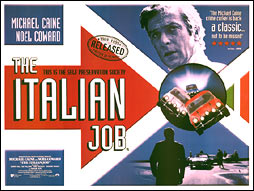
1999 UK Quad
Poster |
|
1999+
Since
the 1999 re-release, The Italian Job has
been released on various DVD's, some being
digitally remastered, some being collectors
editions which have included the infamous
Blue Danube missing scene together with
exclusive documentaries featuring interviews
with writer Troy Kennedy Martin, production
designer Disley Jones and stunt coordinator
Derek Ware (Rozzer), original theatrical
trailers and commentary from Producer
Michael Deeley and author of 'The Making
of Italian Job' book Matthew Field.
The
Italian Job is consistently doing well
in various official and unofficial 'Top
100' type film polls and getting high
ratings on online DVD retailer websites.
In 1999, in the midst of "best movies
ever" list-mania, The Italian Job
was placed 36th when the British Film
Institute produced its ranking of the
'100 Favourite British Films' spanning
the first century of film. Almost 26,000
votes were cast, and the results sparked
nearly much debate, mainly because the
poll was conducted by the general public,
as opposed to critics. Another vote, promoted
by Richard Attenborough (also in 1999)
attracted 162.000 votes and The Italian
Job was placed 54th, not bad when you
consider that the poll wasn't just for
British films, but all films!
|